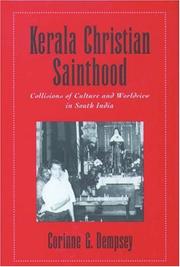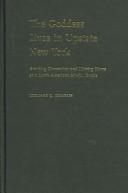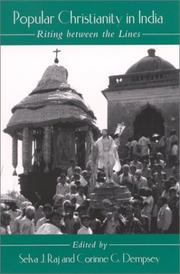| Listing 1 - 8 of 8 |
Sort by
|

ISBN: 0195130286 9780195130287 019983413X 0198029918 1429401729 9786610530564 1280530561 Year: 2001 Publisher: Oxford: Oxford university press,
Abstract | Keywords | Export | Availability | Bookmark
 Loading...
Loading...Choose an application
- Reference Manager
- EndNote
- RefWorks (Direct export to RefWorks)
"Kerala Christian Sainthood is an ethnography-based study that celebrates the multi-vocal function of saints. Drawing on pilgrim anecdotes, shrine practices, official hagiographies, and regional lore, author Corinne Dempsey demonstrates how the business of saints routinely extends beyond their capacity as earthly conduits of miraculous power. Saintly characters described in this book, hailing from the religiously pluralistic south Indian state of Kerala, tend not only to the health and happiness of individual devotees but help craft and express the multiple identities and complex power relations of their devotional communities as well." "Throughout the study, Dempsey highlights the traditions of Sr. Alphonsa of Bharananganam (1910-1946) and St. George the martyr, two figures who reflect the many preoccupations of Kerala sainthood. Sr. Alphonsa, native of Kerala and famous for her life of suffering and posthumous power, stands in line to be canonized by the Vatican. St. George, the caped dragon slayer imported to Kerala by Syrian merchants and later by Portuguese and British colonizers, is today partially debunked by Rome. These two figures, while differing dramatically in temperament, nationality, age of cult, and Vatican standing, boast a vast popular appeal in Kerala's Kottayam district. In examining Sr. Alphonsa and St. George, Dempsey shows how Kerala's saint traditions reflect devotees' hybrid identities in both colonial and postcolonial times." "This ethnography of Christian sainthood within a Hindu cultural context, of "foreign" traditions adopted by native practice, and of female sanctity negotiated through patriarchal expectation is poised at a number of intersections. Dempsey provides not only a comparative study of cultures, religions, and worldviews, but also a unique grounding for contemporary ethnographic, post-colonial, and feminist concerns."--Jacket
Hinduism --- Christian saints --- Christians --- Christianity and other religions --- Relations --- Christianity --- Cult --- Alphōnsa --- Kerala (India) --- Religious life and customs --- 281.82*1 --- -Christian saints --- -Christianity and other religions --- -Hinduism --- -Religions --- Brahmanism --- Syncretism (Christianity) --- Religions --- Saints --- Canonization --- Religious adherents --- Syro-Malabaarse katholieken --- -Christianity --- History --- Alphōnsa Sister --- -Cult --- -Kerala (India) --- -Religious life and customs --- -Syro-Malabaarse katholieken --- 281.82*1 Syro-Malabaarse katholieken --- -281.82*1 Syro-Malabaarse katholieken --- Relations&delete& --- Alphonsa, --- Afonsa da Imaculada Conceição, --- Alfonsa de la Inmaculada Concepción, --- Alfonsa dell'Immacolata Concezione, --- Alphonsa of the Immaculate Conception, --- Alphōnsāmma, --- Anna, --- Annakkuṭṭi, --- Annakutty, --- Muttathupadathu, Alphonsa, --- Kerala, India (State) --- Malankar (India) --- Malankara (India) --- Keralam (India) --- Kīrālā (India) --- Travancore and Cochin (India) --- Religious life and customs. --- Hinduism - Relations - Christianity --- Christian saints - Cult - India - Kerala --- Christians - India - Kerala --- Christianity and other religions - Hinduism --- Alphonsa ab Immaculata Conceptione --- Kerala --- Alphonsa, - Saint, - 1910-1946 - Cult - India - Kerala --- Kerala (India) - Religious life and customs --- Alphonsa, - Saint, - 1910-1946

ISBN: 9780195187298 0195187296 9780195187304 019518730X Year: 2006 Publisher: Oxford ; New York : Oxford University Press,
Abstract | Keywords | Export | Availability | Bookmark
 Loading...
Loading...Choose an application
- Reference Manager
- EndNote
- RefWorks (Direct export to RefWorks)
Corinne Dempsey profiles an unusual South Indian temple community in Rush, New York, outside Rochester. The temple, established by a charismatic non-Brahman Sri Lankan Tamil, stands out for its combination of orthodox ritual meticulousness and socioreligious iconoclasm. The vitality with which devotees participate in ritual themselves and their ready access to the deities contrasts sharply with ritual activities at most North American Hindu Temples, where (following the usual Indian custom) ritual is performed only by priests and access to the highly sanctified divine images is closely guarded. Drawing on several years of contact with the guru and his followers, Dempsey uses the Rush temple's surprising success to analyze the distinctive dynamics of diaspora Hinduism, including issues of gender and caste, ethnic community, and spiritual enthusiasm.
Rajarajeshvari (Hindu deity) --- Spiritual life --- Cult --- Hinduism. --- Srī Rājarājeśwarī Pītham (Rochester, N.Y.).
Book
ISBN: 0199339724 0199919593 1283427648 9786613427649 0199860343 9780199860340 9780199919598 9781283427647 6613427640 9780199860326 0199860327 9780199860333 0199860335 9780199339723 Year: 2012 Publisher: New York Oxford University Press
Abstract | Keywords | Export | Availability | Bookmark
 Loading...
Loading...Choose an application
- Reference Manager
- EndNote
- RefWorks (Direct export to RefWorks)
Corinne Dempsey offers a study of Hindu and Christian, Indian and Euro/American earthbound religious expressions. She argues that official religious, political, and epistemological systems tend to deny sacred access and expression to the general populace.
Religion. --- Religions --- Relations.
Book
ISBN: 1438459440 9781438459448 9781438459431 1438459432 9781438459424 1438459424 Year: 2015 Publisher: Albany
Abstract | Keywords | Export | Availability | Bookmark
 Loading...
Loading...Choose an application
- Reference Manager
- EndNote
- RefWorks (Direct export to RefWorks)
Sacred Matters explores the lives of material objects in South Asian religions. Spanning a range of traditions including Hinduism, Islam, Jainism, Buddhism, and Christianity, the book demonstrates how sacred items influence and enliven the worlds of religious participants across South Asia and into the diaspora. Contributors examine a variety of objects to describe the ways sacred materials derive and confer meaning and efficacy, emerging from and giving shape to religious and nonreligious realms alike. Material forms of deity and divine power are considered along with commonplace ritual items, including images, clay pots, and camphor. The work also attends to materiality's complex role within the "materially suspicious" contexts of Islam, Theravada Buddhism, and Roman Catholicism. This engaging collection presents new frameworks for contemplating the ways in which historical, social, and sacred processes intertwine and collectively shape human and divine activity.
Religious articles --- Southeast Asians --- Material culture. --- Southeast Asia --- Religious life and customs.
Book
ISBN: 0791477398 1435694597 9781435694590 9780791476338 0791476332 9780791477397 9780791477397 Year: 2008 Publisher: Albany State University of New York Press
Abstract | Keywords | Export | Availability | Bookmark
 Loading...
Loading...Choose an application
- Reference Manager
- EndNote
- RefWorks (Direct export to RefWorks)
Looks at perceptions of the miraculous in a variety of contemporary South Asian religious traditions-Hinduism, Buddhism, Islam, and Christianity.
Miracles. --- God --- Marvelous, The --- Miracle workers --- Spiritual healing --- Supernatural --- South Asia --- Religion.
Book
ISBN: 1438429819 1441639799 9781441639790 9781438429816 1438429797 9781438429793 9781438429816 1438429800 9781438429809 Year: 2010 Publisher: Albany State University of New York Press
Abstract | Keywords | Export | Availability | Bookmark
 Loading...
Loading...Choose an application
- Reference Manager
- EndNote
- RefWorks (Direct export to RefWorks)
"Frivolity isn't always frivolous - sometimes it can be sacred. Sacred Play uncovers levity and playfulness in a variety of South Asian traditions where one might least expect to find it: in the heart of ritual. Case studies of Hindu, Muslim, Christian, and Buddhist rituals examine instances of levity that challenge social or religious norms, in which mischievous deities inspire similar behavior among their devotees, and where playful competition incites serious consequences. Sacred Play explores how piety and levity can complement and complicate one another, enriching our understanding of both."--Jacket.
Religion --- Ritual --- Cult --- Cultus --- Liturgies --- Public worship --- Symbolism --- Worship --- Rites and ceremonies --- Ritualism --- South Asia --- Religion. --- #SBIB:39A10 --- #SBIB:39A75 --- Antropologie: religie, riten, magie, hekserij --- Etnografie: Azië
Book
ISBN: 9780791476345 0791476340 Year: 2008 Publisher: Albany: State university of New York press,
Abstract | Keywords | Export | Availability | Bookmark
 Loading...
Loading...Choose an application
- Reference Manager
- EndNote
- RefWorks (Direct export to RefWorks)
Claims of the miraculous are foundational to faith and skepticism, making and breaking religious careers and movements in their wake. Drawing on a variety of South Asian religious traditions—Hinduism, Buddhism, Islam, Christianity—this book revolves around the theme of conundrum, demonstrating how miracles offer divine proof, tenacious embarrassment, and, in many cases, both. The contributors explore not only how modern miracles are conundrums themselves but also how they make conundrums out of assumed divides between scientific and supernatural realms, modernity and tradition, the West and the rest, and ethnographer and native.
Miracles. --- South Asia

ISBN: 0791455203 Year: 2002 Publisher: Albany State university of New York press
Abstract | Keywords | Export | Availability | Bookmark
 Loading...
Loading...Choose an application
- Reference Manager
- EndNote
- RefWorks (Direct export to RefWorks)
Christianity --- popular Christianity in India --- rituals --- Indian Christianity --- Christian festivals --- saints --- catse --- national identity --- social and religious structures --- miracle workers --- visionaries --- missionaries
| Listing 1 - 8 of 8 |
Sort by
|

 Search
Search Feedback
Feedback About UniCat
About UniCat  Help
Help News
News